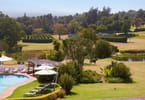Heads of state from member countries of the Southern African Development Community (SADC) are looking to rescue Zimbabwe from sanctions during their weekend meeting in Tanzania.
The SADC heads of state have earlier expressed their political commitment to liberate Zimbabwe from economic sanctions imposed by Britain, the European Union and the United States.
Sanctions were imposed on this African nation 18 years ago as a protest over violation of human rights, suppression of the media freedom and the undermining of the democratic process under the former President Robert Mugabe.
Tanzanian Foreign Minister Prof. Palamagamba Kabudi said in Tanzanian commercial capital of Dar es Salaam this week, that the 39th SADC Heads of State Summit to be held here will seriously push for lifting of these sanctions, to help Zimbabwe achieve its social and economic development.
Campaigns by some African states to liberate Zimbabwe from serious economic woes facing this SADC member state have been aired earlier this year by several African presidents.
South African President Cyril Ramaphosa, Kenyan President Uhuru Kenyatta and the Namibian President Hage Geingob had come forward in pushing campaigns to defend Zimbabwe over the imposed economic sanctions, defending President Emmerson Mnangagwa`s administration in its reform agenda.
President Mnangagwa said the sanctions imposed on Zimbabwe 18 years ago were hurting ordinary people.
“We are struggling against sanctions imposed by the West up to today, by the European Union and the United States. These sanctions are still there, they have not been removed,” he said.
Sanctions were imposed by the EU and the US in 2001 to punish Zimbabwe after the country embarked on the land reform program to redress past imbalances in the ownership of the resource.
The sanctions were later extended to push Zimbabwe change its political stance under the ruling party ZANU-PF to allow fair elections under the opposition voting process, freedom of expression and other, inhuman treatment to Zimbabweans opposing the leadership process of former President Mugabe.
Early this month, the United States has placed Zimbabwe’s ambassador to Tanzania, Anselem Sanyatwe, the former head of the presidential guard on its sanctions list for his involvement in gross violations of human rights.
The American government said that the former Zimbabwe army general, now the Zimbabwean ambassador to Tanzania was on the sanctions list over the killing of six civilians during protests that followed last year’s disputed presidential elections of which President Emerson Mnangagwa won.
The soldiers opened fire on August 1, 2018 on unarmed demonstrators marching against a delay in the publication of the results of the presidential election won by Emmerson Mnangagwa. Six people had lost their lives and 35 had been injured, US said in its report.
“The Department has credible information that Anselem Nhamo Sanyatwe was involved in the violent crackdown against unarmed Zimbabweans during post-election protests on August 1, 2018 that resulted in six civilian deaths,” the State Department said in a statement early this month.
Mr. Sanyatwe was later retired from the army in February and was appointed ambassador to Tanzania.
On the anniversary of the killings, US ambassador to Zimbabwe Brian Nichols said the heavy handed response by the army had dented Harare’s efforts to end its international isolation.
“The killing of six civilians and wounding of 35 more by security forces on that day remains a huge setback for Zimbabwe in the eyes of the international community,” said the US Ambassador.
Human rights groups said the soldiers shot dead at least 17 people and raped dozens of women during the clampdown.
“I have yet to learn of a single soldier or security forces member held to account for the deaths of civilians as the report clearly mandated,” the US Ambassador added.
“Sadly, the ink was barely dry on the report before security forces again acted with impunity killing more civilians in January 2019”, he said.
Mired in a serious economic crisis since the early 2000s, Zimbabwe has been led since late 2017 by President Mnangagwa, who succeeded the authoritarian Robert Mugabe following a military coup.
Despite its promises of openness, the new Zimbabwe regime under President Mnangagwa remains accused of repressing all dissenting voices.
Sanyatwe is the first Zimbabwean to be sanctioned by the United States since the fall of Mugabe.
There are 141 entities and individuals in Zimbabwe currently under US sanctions, US officials said.
هن آرٽيڪل مان ڇا وٺو:
- Sanctions were imposed by the EU and the US in 2001 to punish Zimbabwe after the country embarked on the land reform program to redress past imbalances in the ownership of the resource.
- “The killing of six civilians and wounding of 35 more by security forces on that day remains a huge setback for Zimbabwe in the eyes of the international community,” said the US Ambassador.
- The American government said that the former Zimbabwe army general, now the Zimbabwean ambassador to Tanzania was on the sanctions list over the killing of six civilians during protests that followed last year's disputed presidential elections of which President Emerson Mnangagwa won.






















